
A deafblind university student has ticked the London Marathon off her list of warm-up challenges before she attempts to climb the world’s highest mountain and become the first person with vision and hearing loss in history to reach the summit.
Karolina Pakenaite, 28, from Merseyside, a PhD student in computer science at the University of Bath, crossed the finish line with her guide, Sammar Gurung, 50, on Sunday, in a running time of five hours 18 minutes and 20 seconds.
She was diagnosed with Usher syndrome at the age of 19 after going to the optician for what was supposed to be a routine check up.
The rare, degenerative condition, which only affects about 10,000 people in the UK, means Karolina is slowly becoming increasingly deaf and blind.
She has limited peripheral vision and struggles to see in low light, regularly relying on her guide dog, a golden retriever called Bosley, to get around.
Not knowing how much time she has before her hearing and vision could disappear completely, Karolina is racing to make as many precious memories as possible.
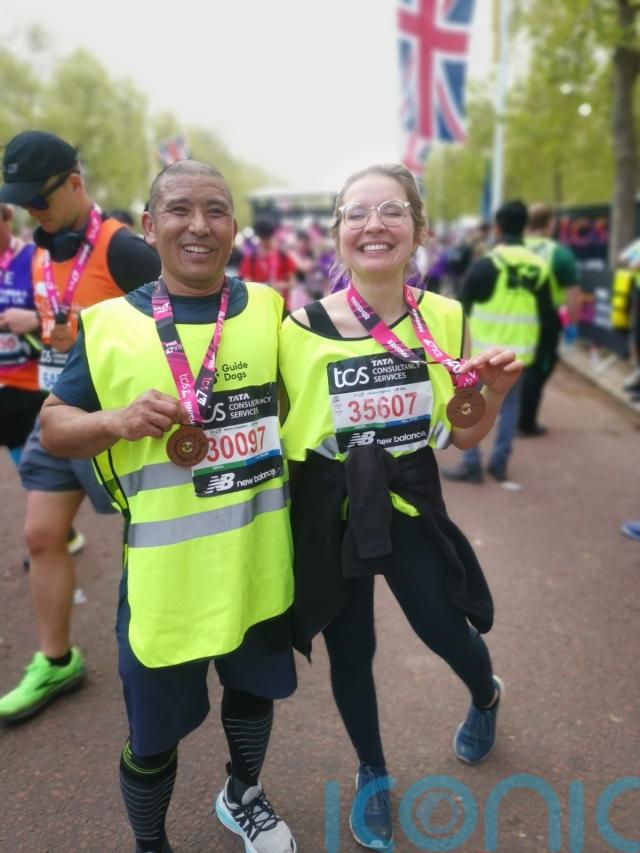
She plans to climb the highest mountain on Earth in April 2026 after completing a series of “warm-up challenges”, one of which was running the London Marathon.
“It was a team effort because he was guiding me,” Karolina, who ran the marathon to help raise money for the charity Guide Dogs, told PA Real Life.
“The final stretch, my legs were hurting, but now I feel fine.
“I’m ready for the next challenge.”
Karolina trained by running with a guide, three or four times a week, including along the Bristol-Bath Railway Path, which is almost equivalent to a half marathon.
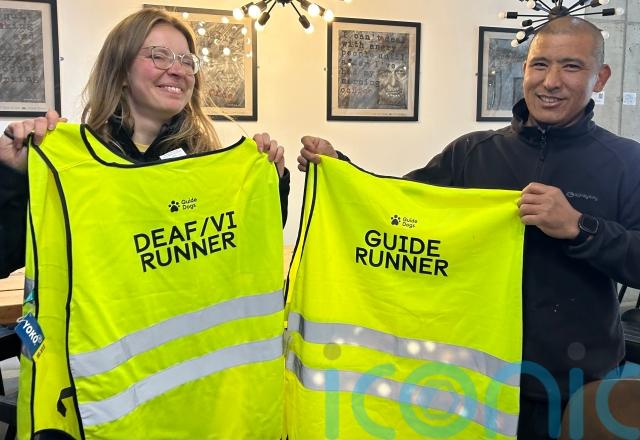
“As a deafblind runner, I have to consider my running route carefully,” she said.
“It’s not safe to run alone, as I might bump into people or objects, and I often miss sounds, especially seeing as transport like electric cars and scooters are almost silent.
“I always have to plan ahead, think about the route, and check if a guide is available.”
The long-distance runs took a toll on Karolina who said she “lost toenails” and suffered “shin splints” along the way.
“Losing toenails from those long-distance runs was a surprise – I never knew that was possible,” she said.
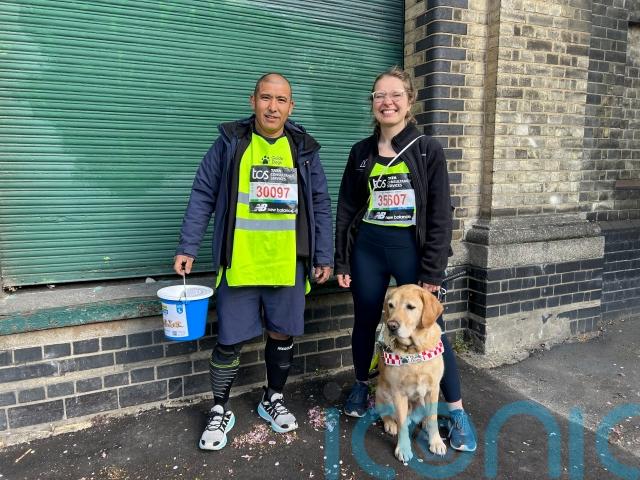
“At first I was nervous running with my sighted guides, trying to keep pace with them and dealing with the shin splints.
“But it ended up giving me the extra push I needed to step up my game.”
When Karolina visited an optician in 2015 for a new pair of glasses, she did not expect it would change her life.
“I did the usual eye tests, expecting nothing more,” she said.
The optician put Karolina through a visual field test, which measures peripheral and all-around vision.
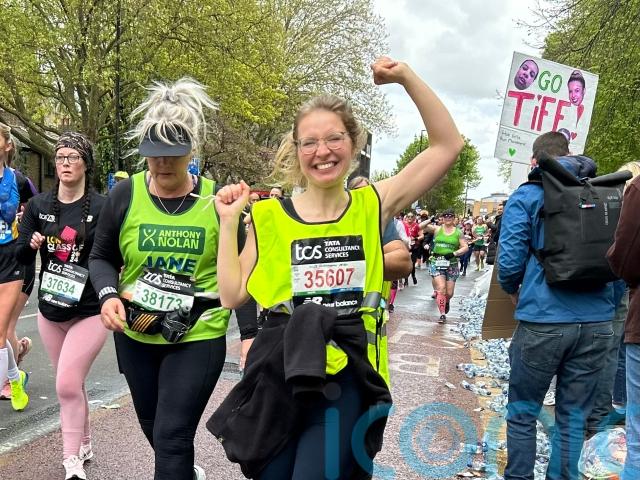
“The opticians thought that the machine was broken and kept hitting the reset button.
“It turns out the machine was just fine, my eyes were the troublemakers.”
Karolina was told to see an eye specialist and advised not to drive.
“My heart sank,” she said.
Doctors diagnosed Karolina with Usher syndrome and she was told her vision would slowly but surely start to fade.
Coming to terms with this devastating news was not easy for Karolina, who was matched with her sponsored guide dog, Bosley in 2017.
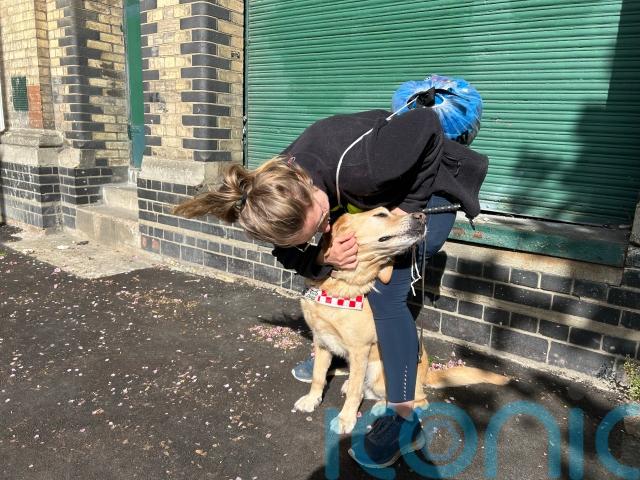
“Since learning about the possibility of becoming deafblind, everything became blurry,” said Karolina.
“I wasn’t prepared to start using a cane or carry the new identity label of being blind.”
At first, she felt like an “impostor” because her symptoms were not always apparent.
“For the longest time I felt like I had an imposter syndrome for being blind,” she said.
“On top of it all, I don’t look visually impaired so it’s also sometimes hard for others to understand if they haven’t spent enough time with me.”
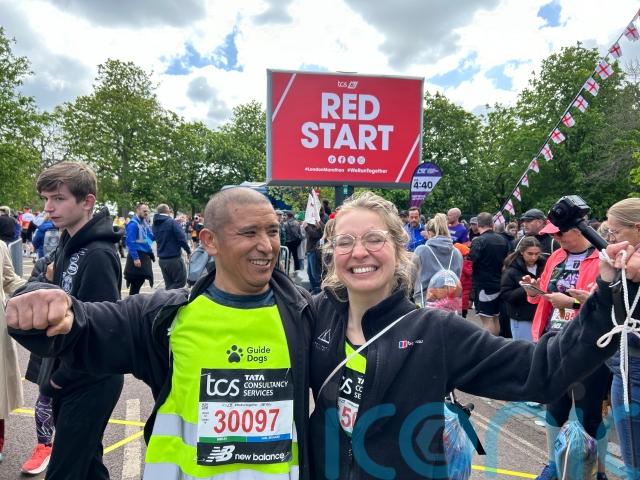
Having Bosley by her side has helped Karolina regain her confidence and face her diagnosis head on.
She said: “I was at one of my lowest points when I first heard I will be going deafblind, but Bosley made me feel like everything is OK.
“Even when I still get lonely days, he pushes me to keep going as we have to look after each other.
“I wouldn’t be as active in the outdoors without him beside me.”
Karolina decided there was no time to waste and has embarked on a quest to make precious visual memories while she still can.
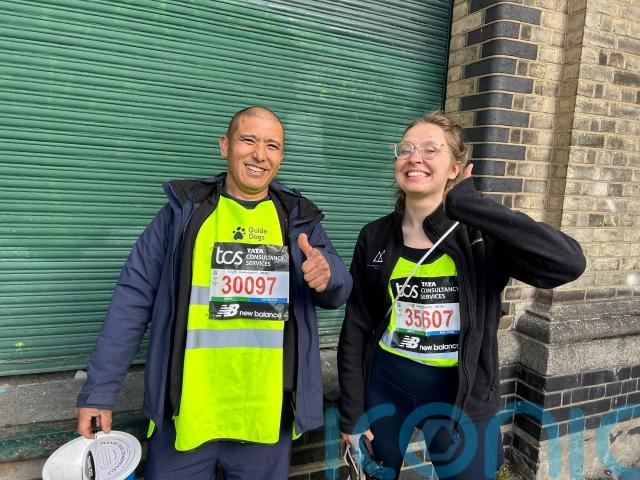
She joined an expedition in May 2023 to Everest base camp with a diverse group of sighted, hearing and deaf climbers.
The group navigated rocky terrain to reach the site at an altitude of 5,364m (17,598ft), guided by a sherpa and under the supervision of team leader Dan Tamang.
It was during this trip that Karolina hatched a plan to become the first deafblind person to summit Everest.
“I always had the dream to summit Mount Everest but it was a fantasy,” she said.
“Then, after speaking to other climbers I realised it is a possibility and that I could be the first deafblind person to do it – and I wanted to claim that spot.”
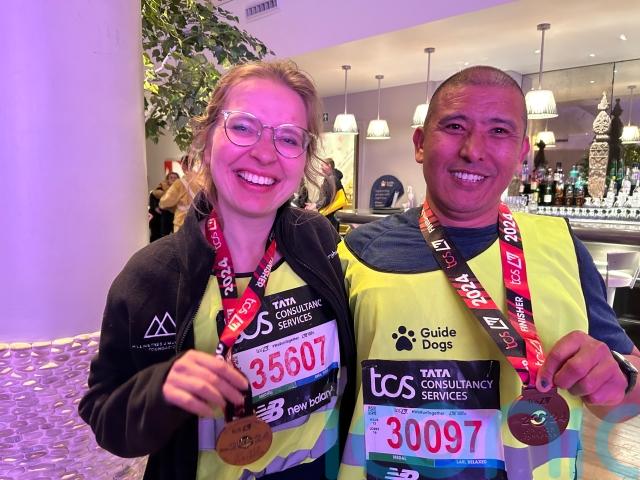
But before attempting the climb, Karolina has set herself seven milestones, the first of which was running the Bath half-marathon in October 2023.
Last month she completed her second challenge, a winter skills course at Glenmore Lodge with her team in Scotland which was sponsored by The John Muir Trust.
On Sunday she ticked another challenge off her list when she finished the London Marathon.
But she still has a long way to go.
Karolina plans to attempt the National Three Peaks Challenge later this year, climbing the three highest peaks of Scotland, England and Wales, before setting her sights on more serious climbs.
She will then attempt South America’s highest peak, the 6,962m (22,841ft) Aconcagua, in November 2024, the Denali summit, North America’s 6,190m (20,310ft) equivalent in June 2025, as well as Mount Manaslu in September, the world’s eighth-highest mountain at 8,163m (26,781ft), part of the Nepalese Himalayas.
If everything goes to plan, Karolina will be ready to face Everest in April 2026.
An estimated 6,664 people have reached the summit of Mount Everest as of December 2023, according to the Himalayan Database.
While several deaf climbers have reached the summit, it is believed Karolina would be the first deafblind person to follow in their footsteps.
Karolina ran the London Marathon to help raise money for the charity Guide Dogs and has launched a fundraiser on GoFundMe which has so far received about £450.
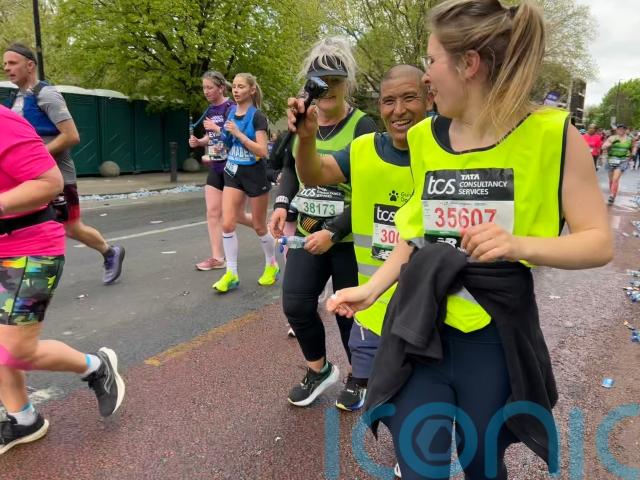
Patrick Browne, Guide Dogs’ head of events, says: “We can’t thank Karolina and everyone running the London Marathon for Guide Dogs this weekend enough.
“All their time and dedication that has gone into taking on the challenge to raise vital funds will make a huge difference in helping us to provide our life-changing work and reach even more people with sight loss.
“Karolina’s journey is inspirational and her story will have a real impact in raising awareness of sight loss and the support available. Everyone at Guide Dogs will be cheering Karolina on as she continues her incredible challenges.”
To support Guide Dogs in helping people with sight loss live the life they choose, visit www.guidedogs.org.uk
Subscribe or register today to discover more from DonegalLive.ie
Buy the e-paper of the Donegal Democrat, Donegal People's Press, Donegal Post and Inish Times here for instant access to Donegal's premier news titles.
Keep up with the latest news from Donegal with our daily newsletter featuring the most important stories of the day delivered to your inbox every evening at 5pm.